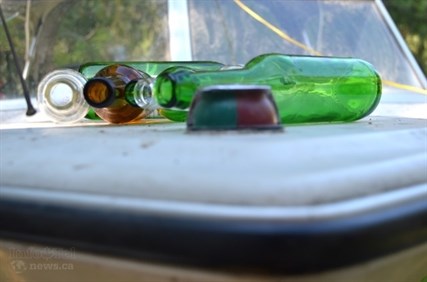
(CHARLOTTE HELSTON / iNFOnews.ca)
July 10, 2013 - 6:00 AM
NORTH OKANAGAN - The Conservation Service is seeing lagging compliance in the areas where drownings are most likely to occur.
Sgt. Josh Lockwood, North Okanagan zone supervisor, says bigger boats on bigger lakes, like Okanagan and Kalamalka, are following the rules closer than little fishing boats on smaller lakes around the region.
"Statistically, small boats on small lakes are where we see the highest number of drownings," Lockwood says.
He says there's a misconception that smaller lakes are less dangerous.
"People say, it's a little lake without any speed boats or waves. They think, if there's a storm, it'll be easier to get to shore," he says.
But accidents can happen anywhere, and to anyone.
"Every time we have to go out, our officers are put at risk because people weren't complying with the rules."
Recently, a canoeist was fined over $500 for not having any safety gear on board. Lockwood says no matter where you are or how good a swimmer you are, safety equipment is essential.
During a recent sweep of Sugar Lake, Lockwood says officers found "100 per cent zero compliance." Violating the rules can range from not having enough life-jackets to failing to produce an operator's card. While a disappointing percentage, Lockwood says on the whole there have been gains in recent years. Officers aren't having to write fines for operator cards as often, something he says was a huge issue a few years ago.
"It (operator card) has been in effect since 2000, so people are starting to get the message," Lockwood says, noting wind and human powered vessels do not require a card, only those with motors.
But there are ongoing frustrations for the Conservation Service, such as fishermen not crimping their hooks in protected waters.
"With a barbless hook, (the fish) bleeds a little bit, but like a pin, it comes right out," Lockwood says. "With a barb it will tear the flesh and the meat right off. You can't properly release a fish with a barb."
Another persistent issue is drinking and boating. Last weekend, three boats were removed from Okanagan Lake due to alcohol impairment.
"They were stationary, anchored in the lake, so they weren't arrested or fined," Lockwood says.
The boats were towed to shore, but had the officer arrived a bit later, he may have caught the boaters on their way back to dry land, and the outcome could have been very different.
"(A lack) of compliance is always concerning for two reasons," Lockwood says. "One for the protection of our natural resources, and two, for public safety. We don't want to see any tragedies."
To contact the reporter for this story, email Charlotte Helston at chelston@infotelnews.ca, call (250)309-5230 or tweet @charhelston
News from © iNFOnews, 2013